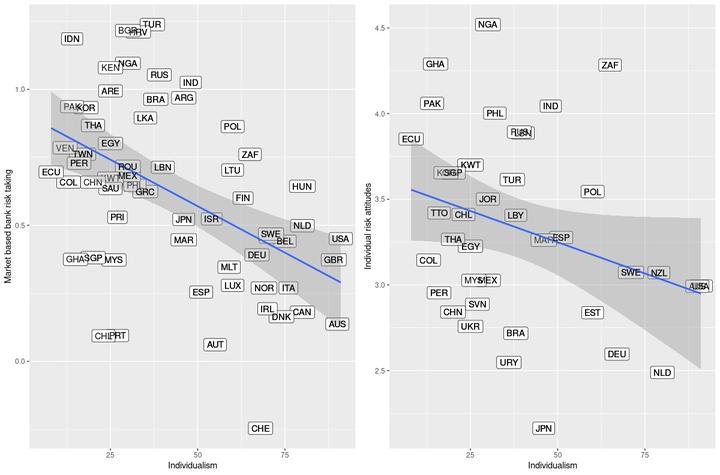National Culture and Risk Taking (2017-20)

Illiashenko, P., & Laidroo, L. (2020)
National culture and bank risk-taking: Contradictory case of individualism..
Research in International Business and Finance, 51, 101069.
Previous studies have reported a positive association between the cultural dimension of individualism and bank risk-taking. We hypothesize that this association is likely to be confounded by the omitted effects of corporate governance. Given the indicative evidence that such confounders are less likely to affect listed banks, we test this association for a global sample of 467 commercial listed banks from 56 countries. Our results show that the association between individualism and bank risk-taking is negative. This result is consistent with the cushioning hypothesis, the idea that people take on more risk in collectivist societies because they expect to receive help from the members of their social networks in the case of failure.
Illiashenko, P. (2019)
“Tough Guy” vs.“Cushion” hypothesis: How does individualism affect risk-taking?.
Journal of Behavioral and Experimental Finance, 24, 100212.
Corporate finance literature reports a positive association between the cultural dimension of individualism and firm risk-taking, assuming that national culture directly affects the decision-making of corporate executives (tough guy hypothesis). In contrast, studies that link individualism and risk-taking at the individual level find that individuals in collectivistic societies tend to take greater risks (cushion hypothesis). These findings are difficult to reconcile since both strands of literature have important limitations. While findings from corporate finance literature might be not robust to alternative explanations, behavioral finance studies rely on a small number of countries in their respective samples. This study contributes to the second strand of literature by testing the prediction of cushion hypothesis on the individual-level data from three different sources that cover 25, 49, and 41 countries respectively. The cumulative evidence indicates that, consistent with the cushion hypothesis, the link between the individualism and risk-taking is negative.